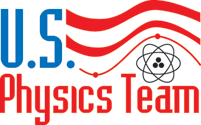Home
Team Facts & News
The Olympiad is a nine-day international competition among pre-university students from more than 60 nations. — AAPT.ORG

Each year, AAPT and the American Institute of Physics (AIP) sponsor a competition for high school students to represent the United States at the International Physics Olympiad Competition. The mission of the U.S. Physics Team Program is to promote and demonstrate academic excellence through preparation for and participation in the International Physics Olympiad. Photos of the 2016 Team and camp are available on Flickr.
Important Dates
December 14, 2015 - F=ma Registration Deadline
January 19-24, 2016 - F=ma Testing Dates
March 14-25, 2016 - USAPhO Testing
May 26 - June 6, 2016 - U.S. Physics Team Training Camp, University of Maryland
July 10-18, 2016 - International Physics Olympiad, Switzerland & Liechtenstein
News
2016 U.S. Physics Team Scores 2 Gold and 3 Silver Medals. Read the AAPT Press Release, and the APS Press Release.
6/06/2016
U.S. Physics Team Travelers selected for the 2016 International Physics Olympiad. Read the AAPT Press Release.
5/18/2016
Meet the 2016 U.S. Physics Team Members, team biographies will be coming soon.
A Note about team selection:
5/9/2016
2016 U.S. Physics Olympiad Medal Ranking List, USAPhO solutions will be posted soon. U.S. Physics Team Members and bios will be posted soon.
5/9/2016
A listing of students who took the USAPhO can be found by clicking HERE! The cutoff score this year was 14. F=ma solutions will be posted soon.
2/24/16
F=ma scores have been emailed to the teachers/proctors who administered the exam. The cut off score for students to qualify for the USAPhO exam is 14 and above. Student scores will not be given out over the phone at the AAPT office, students and parents will need to contact their teachers/proctors to find out their scores. A formal listing of Semifinalists, and the Medal Ranking for the USAPhO exam will be posted after the exam dates.
2/19/2016
F=ma results will be sent to the teachers/proctors on or about February 24th, at that time the cut off score for the USAPhO exam will be posted. USAPhO exam dates will be March 14-25, 2016.
Contact Information
For more details and information about the US Physics Team, please contact AAPT's Programs department at 301-209-3340 or programs@aapt.org

